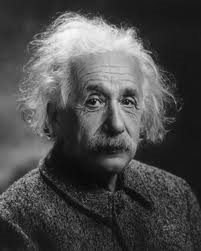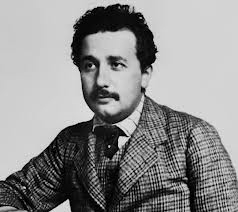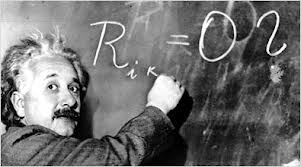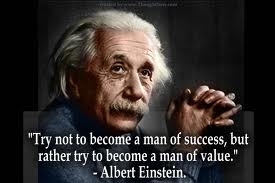 |
| Portrait of Albert Einstein (Oren Jack Turner) |
A solemn, young man sits unmoving at a small, aged desk in a dimly lit room. His eyes are fixed on a sealed letter, slightly browned and crinkled at the edges. It stares challengingly back at him with the words "Swiss Federal Institute of Technology" on its face. He takes a deep breath and reaches for the letter. Breaking the seal open with his finger, he gingerly extracts the paper tucked inside and reads it tentatively. After a long moment, he hangs his hands limply to his sides and stares distantly. Three words echo through his mind: shows no promise. A few years later, this young man would publish a groundbreaking paper about a certain theory of relativity, marking the start of an illustrious career. Recognized around the world by his simple, bemused smile and iconic riot of tousled white hair, Albert Einstein's name is synonymous with "genius". Born in Ulm, Germany on March 14, 1870, Einstein began his early education in Munich, where he did not perform particularly well. "He was not a child prodigy; in fact, he was unable to speak fluently until the age 9" ("Albert Einstein"). However, at the age of 5, he became fascinated with science after contemplating about the forces involved with directing the needle of a compass his father gave him. Einstein went on to master Euclidean geometry and calculus by the age of 16 ("Albert Einstein"). Einstein is perhaps most noted by his Annus Mirabilis papers, or his Miracle Year in 1905. It saw the publication of Einstein's theory of Brownian motion, the photoelectric effect, which would earn him the Nobel Physics Prize in 1921, and his revolutionary theory of relativity, which assured his fame in history ("Albert Einstein"). However, it was not without periods of hardships and adversities that challenged Einstein's headstrong will to overcome the toughest situations with his head held high. Einstein also embodied humility despite becoming enveloped in praise and attention, a difficult task to do with the bulk of his reputation. As well as being at the forefront of physics, Einstein was also very dedicated to campaigns for peace, acts promoting war relief, Humanist movements, speaking out for equality, and rallying for civil and human rights. Einstein not only revolutionized the intricate world of physics with his renowned theories, he valiantly overcame a myriad of challenges throughout his life and possessed the character to promote peace and moral goodness in order to inspire the world.
 |
| Young Albert Einstein ( de.listofimages.com) |
During Einstein's path to scientific immortality, he still had to overcome and resolve adversities that would eventually shape him into an inspiration known today. When Einstein initially released his new, revolutionary paper about relativity, he encountered close-minded resistance: "Upon its publication, the special theory of relativity met with scorn among those scientists who bothered to pay attention to it at all. But as the young theoretician published his other equally-controversial papers--most of them on topics so advanced only a handful of physicists understood them--more and more of his colleagues began to notice the genius in their midst" ("Albert Einstein"). Einstein's publication of his theory of relativity would eventually change the way scientists view the world; however, the radical approach of Einstein's paper wasn't welcomed because of its confliction with widely accepted ideas and theories already established. Recognizing the blunt negativity to his paper, Einstein resolved not to be perturbed by the response but to channel his energy into creating more brilliant papers and successfully altering his colleagues' point of view. Following Einstein's success in the scientific community, he became very invested in his humanitarian efforts but came to face another life threatening obstacle. He would show that developing health issues would not deter him from rallying for his beliefs: "During the late 1940s, Einstein began to suffer from health problems that doctors attributed to a heart aneurysm. He ignored their advice to take it easy and kept busy with his research, raising money for war relief organizations, lobbying on behalf of the World Government Movement, speaking out for human rights and for civic and academic freedoms jeopardized by anti-communist hysteria, decrying the escalation of the arms race, and lending his support to Zionism" ("Albert Einstein"). As a result of immense courage and prevalent willpower, Einstein was determined to continue with his selfless efforts to promote peace and virtue despite pressing matters with his heart. He demonstrated the powerful attribute of putting something he fervently believed in before his own personal well being. Einstein proved that he had the amazing strength and resilience to overcome many challenges along the way to being one of the greatest thinkers in history.
 |
| Einstein explains an equation (twfec.org) |
Einstein's distinct passion for promoting moral ideals and world peace was also one of his most admirable traits. He was dedicated and emotionally invested in his beliefs and was determined to advocate them. "At the same time, he was a public figure who gave generously of his time and energy to causes he supported, enduring harsh criticism and even risking death as a result of the stands he took on some of the major issues of his day.Yet his commitment to the right of every human being to freedom, truth, justice, and opportunity was unyielding and allowed for no ambiguity" ("Albert Einstein"). Einstein was willing to sacrifice his reputation and even his life for causes that he thought were important enough to uphold. His unyielding persistence to elevate the rights and equality of humanity was a significant part of the ideals he held near to him. In fact, he envisioned a world where humanity should be based on pure traits and morality. "Man's ethical behavior should be effectively grounded on compassion, nurture, and social bonds. What is moral is not of the divine, but rather a purely human matter, albeit the most important of all human matters...These ideals and convictions-results of historical experience, empathy, and the need for beauty and harmony-have usually been willingly recognized by human beings, at least in theory" (Einstein, Albert). In his essay, Einstein writes about how mankind should be held to a standard of peace and unity, solidifying the sense of social ethics among one another. He asserts that, in order to find and direct one's moral compass, one must look within and act toward one's beliefs. The philosophical and humanitarian facet of Einstein's personality consisted of an unbridled passion for justice and right, a strong belief in peace and equality among mankind, and a distinct passion for morality.
 |
| Einstein quote (invenflow.wordpress.com ) |
Einstein single-handedly transformed the way the world thinks about physics, theology, and philosophy. He encountered some opposition along his path to greatness but persevered with an overwhelming sense of drive and motivation. Also, he lent his contributions to humanity by promoting ethical choices and moral integrity. As Einstein once said, "Peace cannot be kept by force; it can only be achieved by understanding." That was exactly what he sought out to do. Einstein's life goal was to see a realm of compassion and unity, where war and malevolence was replaced with resilience and peace. He believed morality was an integral part of every human, but that it can become shrouded by ignorance and hate. In his efforts to instigate pacifism and nonviolence, he had to trust in his beliefs and never let anything change that. Einstein's uplifting messages and amazing character serve to inspire many others, including me. I strive to emulate his profound ideals and convictions. Through his dedication and drive, Einstein inspires me and countless others to stay true to ourselves and to defend our beliefs passionately. He completed his accomplishments with a passionate sense of optimism and focus, allowing him to emerge out of his adversities with a benevolent smile upon his face. Through Einstein's life and accomplishments, he exemplified logic, perseverance, motivation, integrity, and pure inspiration. His immortal legacy will continue to encourage the greatness of others forever. And those individuals will have all the promise in the world.
Works Consulted
"Albert Einstein." Contemporary Heroes and Heroines. Vol.2. Gale, 1992. Gale Biography In Context. Web. 9 Dec. 2012
"Albert Einstein." Encyclopedia of World Biography. Detroit: Gale, 1998. Gale Biography In Context. Web. 6 Dec. 2012.
"Albert Einstein." Scientists: Their Lives and Works. Gale, 2006. Gale Student Resources In Context. Web. 8 Dec. 2012.
"Dr. Albert Einstein: Theoretical Physics, Relativity and the Photoelectric Effect, 1935." Albert Einstein: The Nature of a Genius. N.p., 2004-2012. Web. 09 Dec. 2012.
Einstein, Albert. "An Ideal of Service to Our Fellow Man." Princeton: 1954
Page created on 1/10/2013 12:00:00 AM
Last edited 1/10/2013 12:00:00 AM
